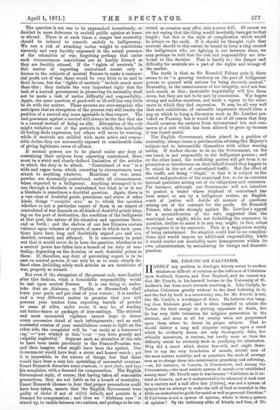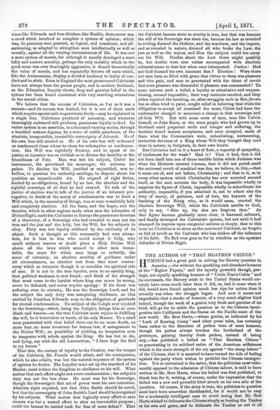MR. FROUDE ON CALVINISM.
ITARDLY any problem in theologic history seems to modern JL thinkers so difficult of solution as the influence of Calvinism upon Scotland, Geneva, and New England, and we cannot say that Mr. Fronde, in his farewell lecture to the University of St. Andrew's, has done much towards resolving it. Like Carlyle, he admires Calvinism greatly without in the least believing in it, and the fact by itself is a noteworthy one, for Mr. Fronde is not, like Mr. Carlyle, a worshipper of force. He believes that hang- ing does Irishmen good, and is often tempted to admire the Tudors for their energy in putting opponents to death, but he has very little toleration for religious persecution in the abstract, and none at all for cruelty when not perpetrated upon those whom he deems its proper subjects. That he should deliver a long and eloquent eulogium upon a creed which he evidently deems not only theologically false, but ethically monstrous, is curious, but hardly more so than the difficulty which he evidently finds in justifying his admiration. Why did a creed which denies free-will, and ought there- fore to sap the very foundation of morals, attract men of the most austere morality, and so penetrate the souls of average men as to change them into missionaries preaching and enforcing, —as, for instance, in Geneva, in Connecticut, and among the Covenanters,—the most austere system of morals ever established , among men? Mr. Froude says it was because "Calvinism as it ex- isted at Geneva, and as it endeavoured to be wherever it took root for a century and a half after him [Calvin], was not a system of opinion but an attempt to make the will of God as revealed in the Bible an authoritative guide for social as well as personal direction." If Calvinism is not a system of opinion, where is there a system of opinion ? By the testimony alike of friends and foes, of Di.
vines like Edwards and free-thinkers like Buckle, there never was a creed which involved so complete a system of opinion ; which was, its premises once granted, so logical, and consistent, and all- embracing, so adapted to strengthen man intellectually as well as morally, against all the varying circumstances of life. It was not a mere system of morals, for although it usually developed a most lofty and austere morality, perhaps the only morality which in the good sense was ever thoroughly aggressive, it denied theoretically the value of morals, and has repeatedly thrown off sects which, like the Antinomians, display a decided tendency to laxity of con- duct and to sloth. Even in England the most pronounced Calvinists have not always been the purest people, and in modern Scotland, as the Education Inquiry shows, deep and genuine belief in the system has been found consistent with very startling relaxations in the sexual ethics.
We believe that the success of Calvinism, so f ar as it was a success—and its success was limited, for it is one of those seeds which require special soils to germinate freely—may be explained in a single line. Calvinism produced of necessity, and wherever thoroughly embraced still produces, passionate loyalty to God. Its entire system is an assertion, in a thousand varying modes, through a hundred austere dogmas, by a score of subtle paradoxes, of the absolute, irresponsible, irresistible sovereignty of Jehovah. He of his own free will created us. He of his own free will redeemed or condemned those whom he chose for redemption or condemna- tion. His Will was rightfully Destiny, and to speak of its justice or injustice was as childish as to discuss the hostility or the friendliness of Fate. Man was but his subject, Christ his instrument, the priesthood his messenger, the universe his palace. To disobey his Will, justified or unjustified, was re- bellion, to question his authority sacrilege, to dispute about his qualities an unpardonable sin. He reigned of right divine, limited by no obligations, bound by no law, the absolute and the rightful sovereign of all that he had created. To talk of the justice of election was to talk of the justice of an inherent pre- rogative, to doubt of the mercy of condemnation was to limit a Will which, in the necessity of things, was at once completely holy and completely absolute. All the fears, and the hopes, and the theories, which in other regions made other men the advocates of DivineRight, made the Calvinists in Europe the passionate devotees of a theocracy, of a Sovereign who had revealed to man not the true and the just and the holy, but his Will, for his subjects to obey. Piety was but loyalty sublimed by the sublimity of its object. Such a thought as this necessarily had rare attrac- tion, for it lent to him who could accept it fully, who could without reserve or doubt place a Holy Divine Will above all the laws which seemed to other men immu- table, the sense for which man longs so ardently, the sense of certainty, an absolute security of guidance under all circumstances, an absolute rest from that inner contro- versy which so torments though it so ennobles the spiritual side of men. It is not in the true loyalist, even to an earthly king, that political weakness is ever found ; and think of the strength that must come to the loyalist whose king can never be wrong, never be defeated, and never require apology ! If his doom was suffering even to eternity, He was the Sovereign Lord, and for the subject the only duty was unrepining obedience, an idea exalted by Jonathan Edwards even to the obligation of gratitude for eternal condemnation. No subject of the Caliph ever rejoiced in the bowstring—which, being the Caliph's, brings him at once death and heaven—as the true Calvinist must rejoice in fulfilling the will, be it benevolent or harsh, of his only Master. To a mind once penetrated with that belief there can be no more doubt, no more fear, no more reverence for human law, if antagonistic to the Divine Will ; no possibility of yielding, no temptation even to temporize with rebels against the King. He has but to die, and dying, say with the old Lancastrian, "I have kept the bird in my bosom."
That this, the ecstasy of loyalty to the Creator, was the temper of the Calvinist, Mr. Froude would admit, and the consequence, which he also admits, was but the natural sequence of the system of opinion he denies. The Loyalist must set up the standard of his Master, must reduce the kingdom to obedience to his will. What matter that such effort might not avert condemnation ; the subject's duty was not the less clear. He must war for his Sovereign, though the Sovereign's first act of power were his own execution. Absolute right required, not that John Smith should be saved, but that the sovereignty of John Smith's Lord should be recognized by his subjects. What matter that logically every effort to save sinners was but a wasted effort to alter an irreversible purpose ; could the banner be carried back for fear of mere defeat ? That the Calvinist became stern to cruelty is true, but that was because the will of his Sovereign was stern too, because his law as revealed in writing doomed the idolater, and the murderer, and the impure, and as revealed in nature, doomed all who broke the Law, the just as well as the unjust, and Man the subject could but carry out his Will. Doubts about the Law there might possibly be, but doubts were sins unless accompanied with absolute submissiveness to that law when once interpreted. Justice! Had not God doomed his own innocent Son ? Election ! Were there not men born so filled with grace that virtue to them was pleasure and vice pain, and men so penetrated with the thirst of revolt that even pleasure was distasteful if pleasure was commanded? To some natures such a belief, a loyalty so submissive and unques- tioning, seemed impossible ; their very instincts recoiled, and they either rejected the teaching, or, after struggles such as Mrs..Stowe has so often tried to paint, sought relief in believing that while the obligation to accept all remained the same, Christ had been the ambassador charged to announce a change in that sovereign and all-holy Will. But with some sorts of men, men like Calvin himself, or John Knox, or the stern people who had grown up in Scotland amid perpetual strife and hunger and suffering, the doctrine found instant acceptance, and once accepted, made of them what the Covenanters were, unhesitating, unreasoning, invincible devotees of a King whose Will they thought they read clear in nature, in Scripture, in their own hearts.
But Calvinism had in it a heart of flesh, a capacity of sympathy, of tenderness for the weak ? Had it? That it had, that it did not form itself into one of those terrible faiths which Judaism was when the Hebrews entered Canaan, that it did not perish amid the universal revolt of mankind was due, we believe, to this,—that it arose out of, and not before, Christianity ; and that in it, as in every other system which Christianity has ever accreted around itself, as the soul accretes the body, it was impossible wholly to suppress the figure of Christ, impossible wholly to subordinate his authority, impossible, if you admitted it, not to admit also the duty of mercy, of patience, and of love, the keynote of the teaching of the Being who, as it would seem, exerted the absolute Sovereign Will, which the Calvinists ascribe to God, only to say, "Rise up, thy sins are forgiven thee." As that figure became gradually more clear, it leavened, softened, and finally destroyed the Calvinistic system, but not until it had stamped its impress upon congenial natures so deeply, that to this hour no Christian is so stern as the convinced Calvinist, no Sceptic so full of revolt as the Calvinist who has shaken off the influence of his faith. No Red ever goes so far in rebellion as the apostate defender of Divine Right.

































 Previous page
Previous page